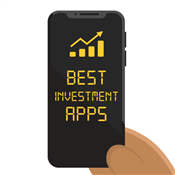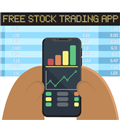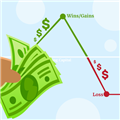Best Trading Platform for Beginners
Need help choosing a trading platform? Discover the 12 best for beginners in this comprehensive guide.
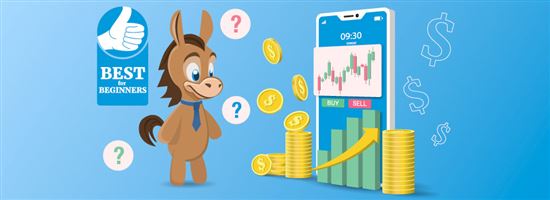 |
Deciding on the right trading platform can be difficult, even for experienced investors. For new investors, it can quickly get overwhelming.
Ideally, you find a broker that's easy to use, offers useful tools, and doesn't cost an arm and a leg. But with so many choices, many investors get stuck in analysis paralysis.
Make your life a little easier with this guide to the 12 best trading platforms for beginners. Compare features, benefits, and fees down below. Plus, learn about the key features you shouldn't miss when choosing an online brokerage.
Best Trading Platforms for Beginners
 |
You might feel like it's important to get started ASAP. But taking a little time to weigh your options can have outsized benefits long term.
Below, let's look at the best trading platforms for beginners.
1. TD Ameritrade
You've probably heard of TD Ameritrade. This popular platform offers commission-free trading on stocks, ETFs, and options, and there are no account minimums needed to access the best features.
If you're interested in learning how to make sound investment decisions, they offer an extensive range of analytical tools that can help.
When you're planning for your financial future, being informed is a big deal. With TD Ameritrade, you'll get access to heat maps, earnings calendars, and the ability to do back testing, a research technique that tests your strategy against historical market data.
And you can practice trading risk-free with their paper trading account.
They offer a range of standard investing accounts, individual and joint, retirement accounts, including Traditional IRAs, Roth IRAs, and Rollover IRAs, 529 Plans, tax-free Coverdell, or UGMA/UTMA accounts for minors and education, as well as trusts and pension plans.
Benefits:
- Commission-free trading
- Trade stocks, ETFs, options, and futures
- Trusts and pensions
- Analytical tools
- No account minimums
- Demo account
- Mobile app
- Individual and joint investment accounts, Traditional IRAs, Roth IRAs, Rollover IRAs, 529 Plans, tax-free Coverdell, and UGMA/UTMA accounts
| Features | TD Ameritrade |
|---|---|
| Educational Resources | Stocks, ETFs, Bonds, Options, Mutual Funds, Retirement |
| Minimum Deposit | $0.00 |
| Stock Trading Fee | $0.00 |
| ETF Trading Fee | $0.00 |
| Mutual Fund Trading Fee | $49.99 |
TD Ameritrade: Commission-Free Trading - Online Stock, ETF and Option Trades
Applies to U.S. exchange-listed stocks, ETFs, and options. A $0.65 per contract fee applies for options trades, with no exercise or assignment fees.
2. Fidelity
Fidelity is another well-known stock exchange that has a lot to offer for beginners.
They have in-depth research tools as well as articles and videos to get you started, regardless of your experience level. Normal trades are commission-free.
They offer a variety of tools for planning and advice, including Fidelity Go, a robo-advisor that will help you achieve your financial goals, the ability to get wealth management support from real professionals, and a hybrid system where you can get help from a robo-advisor and a live coach when you need it.
If you're planning for retirement, they can quickly determine your "retirement score" to see if you're on track to meet your goals.
You also get access to an estate planner that will help you find an attorney and tools to help choose a trading strategy that is right for you. And they have a customer service department with a solid reputation.
You can invest in a wide range of securities, including stocks, mutual funds, ETFs, bonds, and CDs, and open IRA accounts, 529 college savings accounts, or cash management accounts.
Benefits:
- Commission-free trading
- Trade stocks, mutual funds, ETFs, bonds, and CDs
- Financial planning assistance
- IRA accounts, 529 college savings accounts, or cash management accounts
- Mobile app
| Features | Fidelity |
|---|---|
| Educational Resources | Stocks, ETFs, Bonds, Options, Mutual Funds, Retirement |
| Minimum Deposit | $0.00 |
| Stock Trading Fee | $0.00 |
| ETF Trading Fee | $0.00 |
| Mutual Fund Trading Fee | $49.95 |
3. Robinhood
While Robinhood lacks many of the educational features you might be looking for in a trading platform for beginners, it does stand out for being easy to use.
Thanks to their intuitive, user-friendly design, Robinhood has changed that. They've shown that stock market doesn't have to be intimidating.
Even if you've never traded before, on a platform like Robinhood, you can figure out what you're doing and start trading in a matter of minutes.
They have a commission-free exchange that offers fractional shares, meaning you don't spend half of your investment on a broker.
U.S. investors can trade stocks from the NASDAQ and New York Stock Exchange (NYSE), as well as a range of popular international stocks. Robinhood also offers a limited range of cryptocurrencies, including the most popular like Bitcoin and Ethereum.
As a commission-free exchange, Robinhood makes most of their money by directing user orders to market makers who then execute the trades.
Benefits:
- 100% commission free
- No minimums
- Fractional shares
- Easy to use
- Real-time market data
- Extended trading hours
- Free cash card account
- SIPC protected
- Mobile app
- Limited crypto trading
- 24/7 customer support online and by phone
| Features | Robinhood |
|---|---|
| Educational Resources | Stocks, Options |
| Minimum Deposit | $0.00 |
| Stock Trading Fee | $0.00 |
| ETF Trading Fee | $0.00 |
| Mutual Fund Trading Fee | N/A |
4. E*TRADE
E*Trade is a popular online brokerage that caters to beginners and low-frequency traders, though some (but not all) of their accounts do have a $500 minimum deposit, higher than some of their competitors.
They offer a step-by-step guide for those who are just getting started, and educational resources to help you pick the best investment style based on your goals.
You can invest with a standard account, prebuilt portfolios, or opt for automated investment management.
For hands-on investors, they have market news to keep you up to date, and screening tools help you pick stocks that match set criteria.
E*Trade has an extensive range of investment accounts. These include Traditional, Roth, and Rollover IRAs, Beneficiary IRAs for inherited retirement assets, IRAs for minors, and E*Trade Complete IRAs for retirement-aged investors.
They also have other retirement accounts, such as 401(k)s, SIMPLE and SEP IRAs, plus profit-sharing and investment accounts for small businesses.
Their brokerage accounts include a normal trading and investing account, Coverdell ESAs for education, and custodial accounts for minors.
You're even able to apply for a mortgage through E*Trade, if you're in the market for a house.
Benefits:
- Extensive brokerage and retirement accounts
- Banking services, including checking and savings
- Trade stocks, options, futures, mutual funds, ETFs, bonds and CDs
- Prebuilt or managed portfolios
- Stock screener
- Investing guidance
- Mobile app
- Commission-free trading
| Features | |
|---|---|
| Educational Resources | Stocks, Bonds, Mutual Funds, ETFs, Bonds & CDs, Margin Trading, Retirement |
| Minimum Deposit | $0.00 - $500 |
| Stock Trading Fee | $0.00 |
| ETF Trading Fee | $0.00 |
| Mutual Fund Trading Fee | $0.00 - $49.99 |
5. J.P. Morgan Self-Directed Investing
J.P. Morgan Self-Directed Investing accounts offer unlimited commission-free trading online or through their mobile app, with plenty of useful features for new traders.
If you're interested in learning how to pick stocks on your own, you can work with and learn from a J.P. Morgan Advisor.
When you sign up, you also get access to J.P. Morgan Research, which provides market news and useful analysis that can help inform your trades. Their portfolio builder tool lets you customize your investment strategy.
J.P. Morgan also offers a range of investment and savings account types, including a general investment account, and traditional and Roth IRAs, which can help you plan for retirement or other distant financial goals
Investments include a wide variety of investment options, including stocks, ETFs, mutual funds, and options. You can also purchase fractional shares for as little as $5, regardless of the share price.
Benefits:
- Commission-free trading
- Unlimited trades
- Trade stocks, ETFs, mutual funds, and options
- Market analysis and news
- General Investment, Traditional IRA, Roth IRA accounts
- J.P. Morgan Advisor
- Fractional shares
| Features | |
|---|---|
| Educational Resources | Stocks, Bonds, ETFs, Mutual Funds |
| Minimum Deposit | $1.00 |
| Stock Trading Fee | $0.00 |
| ETF Trading Fee | $0.00 |
| Mutual Fund Trading Fee | $0.00 |
J.P. Morgan Self-Directed Investing - Get Up to $700
- Get up to $700 when you open and fund a J.P. Morgan Self-Directed Investing account with qualifying new money.
- $700 when you fund with $250,000 or more
- $325 when you fund with $100,000-$249,999
- $150 when you fund with $25,000-$99,999
- $50 when you fund with $5,000-$24,999
- Get unlimited commission-free online stock, ETF, fixed income, and options trades when you open an account.
- $0 Online Commission trades
- Choose an account that's right for you: General Investing, Traditional IRA or Roth IRA.
- Access our secure, easy-to-use trading experience online or through the Chase Mobile® app.
- Our powerful tools and resources are built to help you take control of your investments.
INVESTMENT AND INSURANCE PRODUCTS ARE:
6. Vanguard
Ultimately, Vanguard is a platform best for active investors interested in building and managing their own portfolios.
Investing with Vanguard does require a little more expertise than some of their competitors, as you'll be picking your own investments, but the upside is you'll be a more competent investor for it in the long term.
Many of their investment plans have minimum requirements of at least $1,000. They offer a range of options, including Traditional and Roth IRAs, individual and joint accounts, 529 plans for education, as well as small business retirement plans.
Their variety of investment options is extensive and includes mutual funds, ETFs, stocks, CDs and bonds, and money market funds. Vanguard was one of the earliest companies to offer low-cost investing, offering lower fees than many of their competitors.
The Vanguard Digital Advisor has a $3,000 minimum investment, and the Vanguard Personal Advisor has a minimum of $50,000.
Benefits:
- Low-fee trading
- Advisor services
- Digital Advisor
- Trade mutual funds, ETFs, stocks, CDs and bonds, money market funds, ESG funds
- Traditional and Roth IRAs, individual and joint accounts, 529 plans, small business retirement plans, SEPs, 401(k)s, SIMPLE IRAs, 403(b)s
- Mobile app
| Features | |
|---|---|
| Educational Resources | Stocks, Bonds, ETFs, Mutual Funds, Retirement |
| Minimum Deposit | Price of one share for stocks, CDs, Bonds, & ETFs; $1,000 - $3,000 for mutual funds and retirement accounts |
| Stock Trading Fee | $0.00 |
| ETF Trading Fee | $0.00 |
| Mutual Fund Trading Fee | $0.00 |
Vanguard: Norton Internet Security 60-day free subscription
Registered users of Vanguard get a complimentary 60-day subscription to Norton Internet Security. After your subscription has ended, you can purchase the security software at a special price. Norton Internet Security is a leading security software package that protects your computer and network from viruses, hackers, spywares, and phishing attempts.
More Beginner-Friendly Trading Platforms
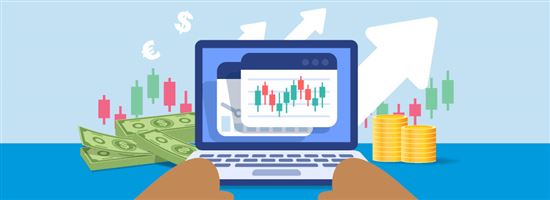 |
Looking for more options? These platforms also make for a great introduction to investing. Review the features they offer to choose the best fit for you.
Merrill Edge
Merrill Edge offers zero-fee trading on stocks, ETFs, and options, with research and analytics to help you choose your trades right.
They have several investment accounts available, including:
- A self-directed account with $0 minimum investment
- Merrill Guided Investing Online, an account with an advisory service built in and a minimum investment of $1,000
- Merrill Guided Investing Online with an advisor, with a $20,000 minimum and a professional to help you along
Depending on your investment, you can earn Preferred Rewards through Bank of America, which may include things like monthly account maintenance fee waivers, credit card rewards bonuses, and discounts on home and auto loans.
They also offer budgeting and retirement planning tools.
Merrill Edge: $100 Bonus Offer
Open a new, qualifying Merrill Edge account using offer code 600ME. Make a qualifying net deposit of $20,000 to $49,999 within 45 days of account opening. Maintain qualifying balance for at least 90 days to receive $100 bonus. Bonus will be deposited into your Merrill Edge IRA or CMA within 2 weeks following the end of the 90 day period.
Webull
Webull offers commission-free trading for stocks, ETFs, and options, with no account minimums.
Users get 3 trades per 5-day period, a restriction lifted for accounts over $25,000. Short selling and options trading are also available.
Among platforms geared toward retail investors, they're known for having extensive research and analytical tools. In July 2021, they added the ability to trade fractional shares, the lack of which was pricing out some investors.
For those looking to safely test their mettle, Webull offers a free paper trading account that allows you to experiment with $1,000,000 of fake money.
Accounts with over $2,000 can also participate in margin trading.
Fund Account and Get Up to $12,000 Bonus
Open a new eligible Webull account. Fund the account with one or more qualifying deposits totaling $5,000 or more. Maintain a net qualifying funding amount of at least $5,000 in the account until the payment of the final installment of the offer reward. The offer reward will be credited to the eligible Webull account in 12 equal monthly installments, with the first installment issued within 45 days after the end of the offer period. To participate in this offer, you must click “Enroll Today” on the website. Terms and conditions apply.
| Net Qualifying Funding Amount | Offer Reward Amount |
|---|---|
| $5,000 - $25,000.99 | $100 |
| $25,001 - $100,000.99 | $750 |
| $100,001 - $250,000.99 | $1,500 |
| $250,001 - $500,000.99 | $3,750 |
| $500,001 - $1,000,000.99 | $5,000 |
| $1,000,001 - $5,000,000.99 | $8,000 |
| $5,000,001+ | $12,000 |
SoFi
Start investing in stocks, ETFs, and crypto with SoFi for as little as $5. SoFi trades are commission-free, and you can trade whole or fractional shares, depending on your goals.
They also recently introduced the option to take part in IPOs, to get trade prices before they hit the exchange.
They offer both self-directed or automated investing options, so there's a plan for you whether you want to go it alone or need a bit of a helping hand.
Opening a SoFi account is as easy as downloading the app and following the step-by-step instructions.
SoFi offers a range of retirement accounts, including Traditional, Roth, and SEP IRAs.
SoFi Invest: Active Investing with SoFi
Interactive Brokers
Interactive Brokers is another commission-free investing platform with investing options that include stocks, options, futures, currencies, bonds, and funds.
They're known for their advanced trading technology, which optimizes speed and efficiency.
Their site has a wide range of educational options, including a Traders' Glossary and Calendar, webinars, videos, a student training lab, blog, and much more.
Their trading tools are professional quality, so beginners may be overwhelmed at first, but if you want to learn, this may be a place to do it.
Interactive Brokers: Referral Program - $200 Bonus
Earn $200 for every referred client who opens a qualifying account using your referral link, and completes qualifying requirements.
Stash
Stash is a micro-investing app that may appeal to investing beginners. They offer lots of guidance to those who are still learning how to choose investments.
They've got over 4,000 stocks and ETFs to choose from. Best of all, they've organized by risk, so you can invest depending on your risk tolerance, whether you're a conservative or ambitious trader. You can also choose to invest in curated themes.
Stash accounts do charge monthly fees.[2] If you're only investing small amounts, be careful not to let the fees consume all your earnings.
They offer traditional and Roth IRA accounts for those interested in saving for retirement as well.
Stash: Sign Up and Get $5
- Sign up, add at least $5 to your account and get a $5 bonus.
- Invest with fractional shares
- Get portfolio recommendations
Ally Invest
Ally Invest offers both Self-directed and Robo Portfolio investing accounts. Their hands-on accounts are commission fee for U.S. stocks and ETFs, as well as a range of other investments.
They provide market analytical tools and detailed research to help you choose the best investment strategies.
You can trade from a range of options, including stocks, ETFs, options, bonds, and mutual funds.
Their Robo Portfolios have a minimum deposit of just $100, with no advisory or annual fees. When you set up your account, you can specify your risk tolerance and your financial goals so that they can pick the best investments for you from a range of low-cost ETFs, which they'll track and rebalance automatically for you.
How to Choose an Online Brokerage Account
There are lots of good online brokers available. But the best trading platforms for you should align with your personal investment goals. Before you decide on a brokerage account, take a look at these key features:
Account Fees
Most online stock brokers do not charge trading commissions for stock or ETF trades. On the other hand, commission-free trades for mutual funds, index funds, and options are less common. In short, account fees can vary a lot between each stock broker.
Make sure you understand the fee structure of your brokerage account. Look for the online trading platform that offer the lowest fees for the assets you want to invest in.
Minimum Investment
Take a look at account minimums as you narrow down your search. Some online brokers have high minimum investments, which isn't ideal if you want to invest with little money. (Most of the trading platforms recommended above have $0 minimum deposit.)
Available Assets
Depending on your experience and comfort levels, you might be interested in a variety of different assets. These could include stocks, exchange traded funds (ETFs), index funds, mutual funds, bonds, forex, and cryptocurrency. Check to see if your brokerage account offers what you want.
Account Options
Online stock brokers offer two main types of accounts: cash accounts and margin accounts. A cash account requires you to make transactions using only the cash you have. A margin account lets you invest using money borrowed from the brokerage firm. Because it's risker, a margin account might not be the best move if you're a beginner.
Educational Resources
For beginners, the best online stock brokers are ones with built-in education and research tools. It's a convenient way to get a better understanding of the financial markets and make more informed investment decisions.
Online trading platforms may offer tools for market research, technical analysis, and more.
Customer Support
Customer support is important whenever you're making any big financial investments. With online stock brokers, great customer support becomes even more necessary. Since you won't be dealing face-to-face with a representative, look for customer service options that work for you.
Many stock brokers give you the option of contacting the support team online or over the phone. 24/7 customer support comes in handy if you have a time-sensitive question about your account.
Frequently Asked Questions
What is an Online Brokerage?
An online brokerage, or online broker, is a trading platform that lets you buy and sell securities (likes stocks and ETFs). The brokerage firm acts as a middle man that helps you make purchases and sales.
You can open a brokerage account through these online brokers. Online brokerage accounts hold your investments and cash.
How much money do I need to open an account?
Many discount brokers typically have low to no minimum deposits to open an account. Discount brokers are online stock brokers that cost less than traditional, full-service brokers.
Some online trading platforms may have higher minimum requirements, especially if it offers investment advice and full brokerage services.
Are online brokerages safe?
If a brokerage firm is a member of the Securities Investor Protection Corporation (SIPC), your money is protected. If the brokerage ever fails, the SIPC protects money in brokerage accounts up to $500,000. This includes up to $250,000 in cash.
Of course, as with any investment, you may experience market losses. But as long as you choose a reputable, SIPC-member brokerage, online trading is safe.
How do I start trading?
If you want to get into trading, try these 5 steps:
- Open a brokerage account. To trade stocks and other securities, you'll need a brokerage account to hold your investments. (Hint: There are plenty of good options above.)
- Understand what kind of investor you are. What's your risk tolerance? Are you more of a passive investor who wants to hold stocks long term? Understanding what you want out of trading will help you decide on an investment style.
- Do your research. Get familiar with the financial markets. Stay up to date on the latest financial and business news. Learn everything you can about trading from multiple sources. This information will help you make better decisions in the long run.
- Practice trading (risk free). Before you put real money into trading, get some practice in first. TD Ameritrade and Webull offer paper trading accounts which let you experiment and learn with fake money.
- Set a plan and stick to it. Your investment plan should include the amount you want to invest, including how much you're willing to let a stock drop before you sell it. Emotions can run high. Sticking to your plan is imperative so you don't let your highs and lows get the best of you.
Bottom Line
There's no reason to be intimidated by the prospect of choosing your first trading platform. Though investing used to be something of a walled garden, it's more accessible to beginners than it's ever been.
That's not to say that you should just jump in blindly. Investing still carries risk, and you should do everything in your power to make sure you're doing it as responsibly and well-informed as you can. You can check the background of your investment professional using FINRA's BrokerCheck.
But know that when you do choose to get started, you won't be in it alone. Choose the platform that's right for you, and you'll be investing like a pro in no time.
References
- ^ OCC. Characteristics and Risks of Standardized Options, Retrieved 4/26/2022
- ^ Stash. Pricing, Retrieved 5/20/2022
Jeremy Harshman is a creative assistant at CreditDonkey, a personal finance comparison and reviews website. Write to Jeremy Harshman at jeremy.harshman@creditdonkey.com. Follow us on Twitter and Facebook for our latest posts.
Note: This website is made possible through financial relationships with some of the products and services mentioned on this site. We may receive compensation if you shop through links in our content. You do not have to use our links, but you help support CreditDonkey if you do.
|
|
|




